The Significance of Growing a Beard in Islam by Dr. Gohar Mushtaq
The Significance of Growing a Beard in Islam by Dr. Gohar Mushtaq
Publisher:
IIPH (International Islamic Publishing House)
Author:
Dr. Gohar Mushtaq
Language:
English
Binding:
Hard Cover
Pages: 109
Size: 24x17cm
Couldn't load pickup availability
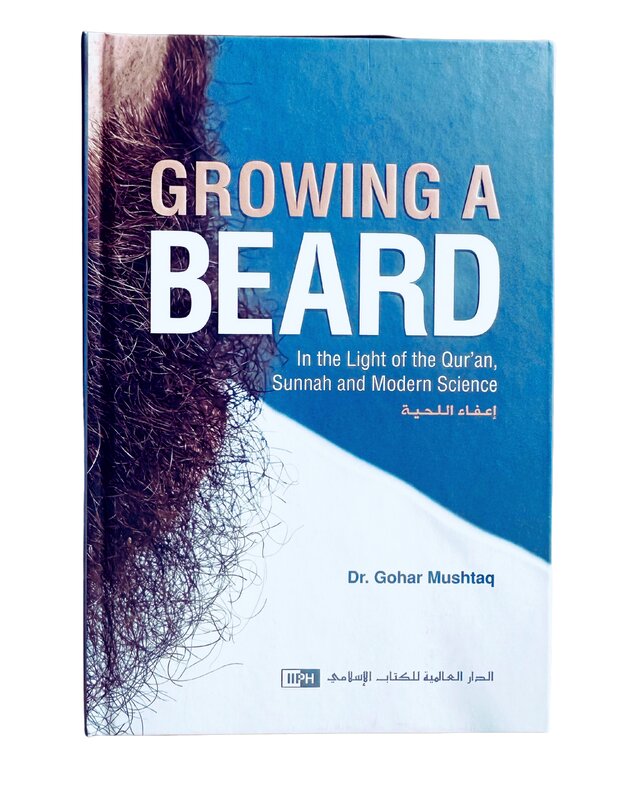
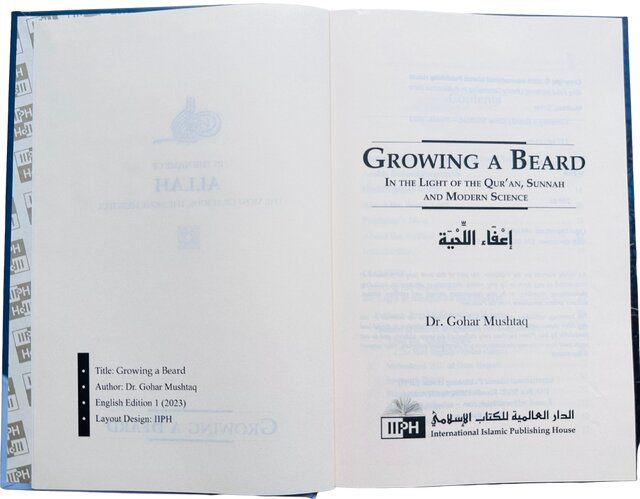
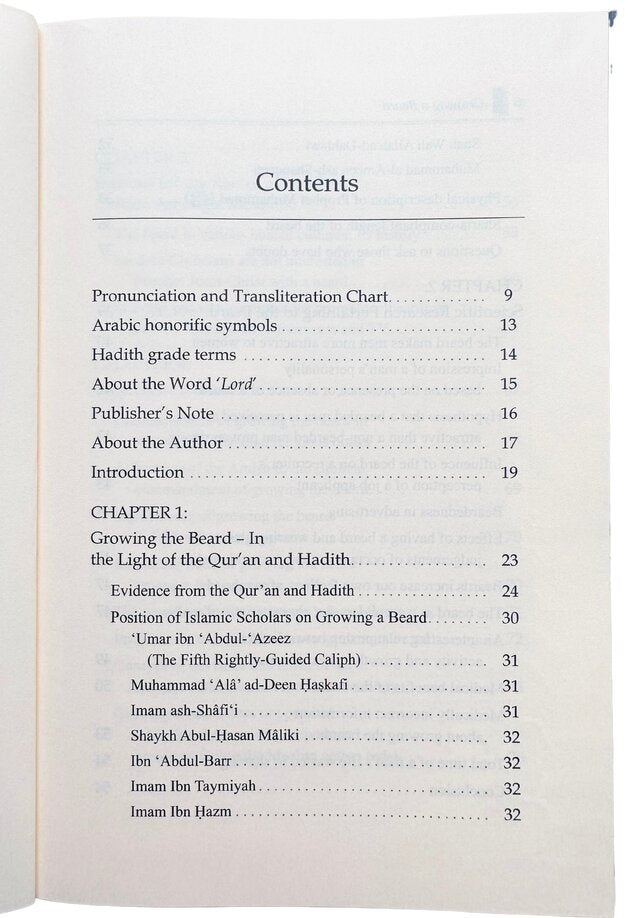
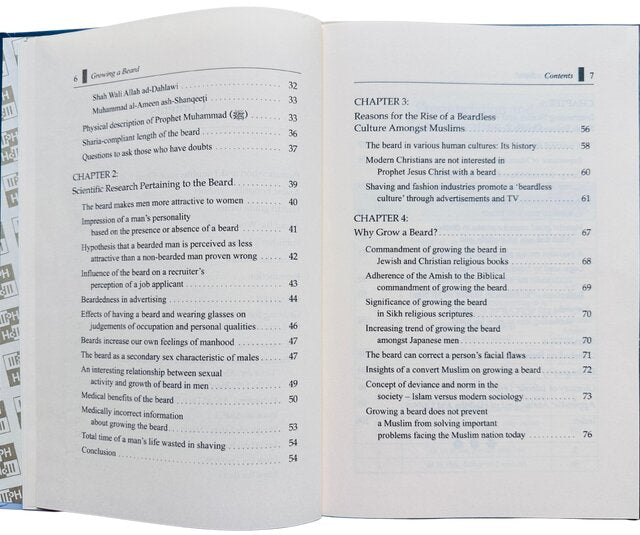

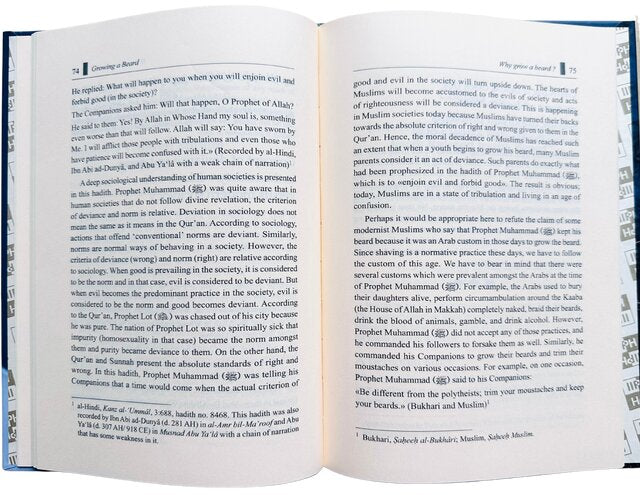
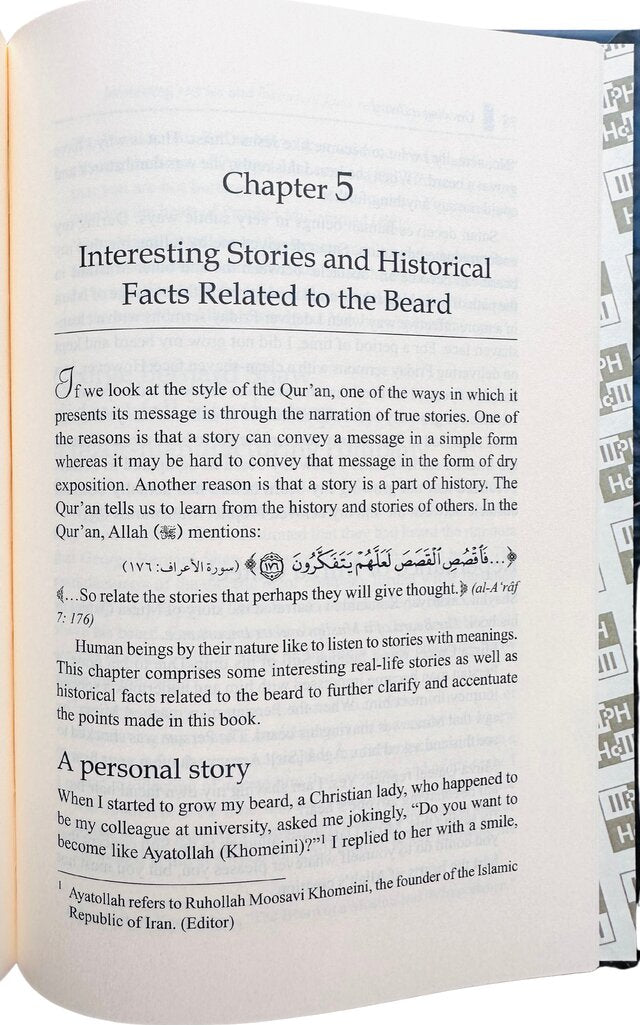
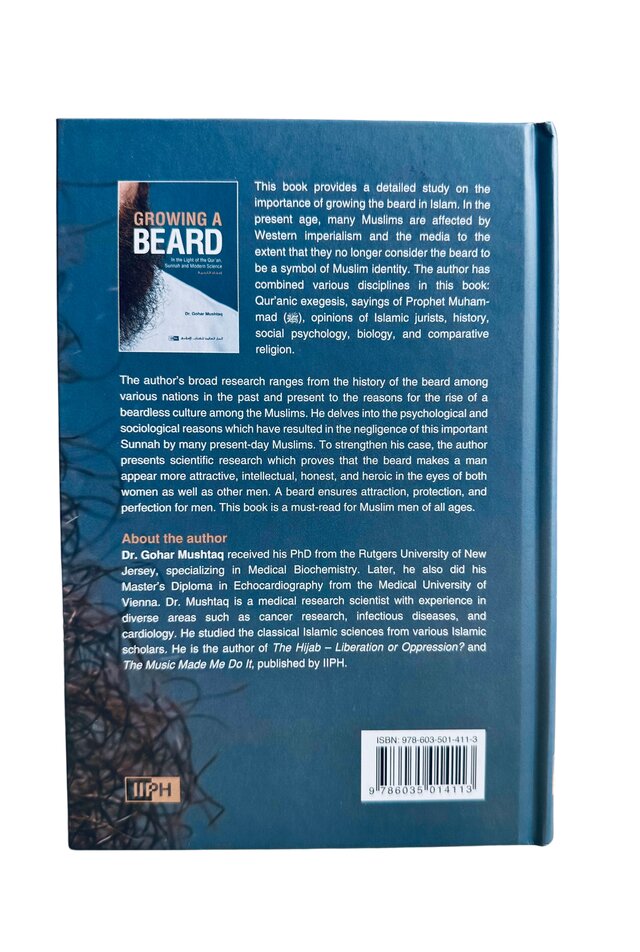
Collapsible content
Description of Book
The Significance of Growing a Beard in Islam by Dr. Gohar Mushtaq
This book provides a detailed study on the importance of growing the beard in Islam. In the present age, many Muslims are affected by Western imperialism and the media to the extent that they no longer consider the beard to be a symbol of Muslim identity. The author has combined various disciplines in this book: Qur’anic exegesis, sayings of Prophet Muhammad (blessings and peace be upon him), opinions of Islamic jurists, history, social psychology, biology, and comparative religion.The author’s broad research ranges from the history of the beard among various nations in the past and present to the reasons for the rise of a beardless culture among the Muslims. He delves into the psychological and sociological reasons which have resulted in the negligence of this important Sunnah by many present-day Muslims. To strengthen his case, the author presents scientific research which proves that the beard makes a man appear more attractive, intellectual, honest, and heroic in the eyes of both women as well as other men. A beard ensures attraction, protection, and perfection for men. This book is a must-read for Muslim men of all ages.
Publisher
IIPH (International Islamic Publishing House)
Author
- Dr. Gohar Mushtaq
Sample Pages - Content
Page:01
GROWING A
BEARD
In the Light of the Qur'an, Sunnah and Modern Science
إعفاء اللحية
Dr. Gohar Mushtaq
الدار العالمية للكتاب الإسلامي IIPE
Page:02
PH
Hal
HR
H
IPH
Hdl
HALIA
GROWING A BEARD
IN THE LIGHT OF THE QUR'AN, SUNNAH AND MODERN SCIENCE
إعفاء اللحية
Dr. Gohar Mushtaq
Title: Growing a Beard Author: Dr. Gohar Mushtaq
English Edition 1 (2023)
PH
Layout Design: IIPH
dll
Иноя
IIPH
الدار العالمية للكتاب الإسلامي
International Islamic Publishing House
ЛЕН
Page:03
Contents
Pronunciation and Transliteration Chart...
Arabic honorific symbols.
Hadith grade terms
About the Word 'Lord'
Publisher's Note
About the Author
Introduction
CHAPTER 1:
13
14
15
16
17
79
19
Growing the Beard - In
the Light of the Qur'an and Hadith..
Evidence from the Qur'an and Hadith
24
Position of Islamic Scholars on Growing a Beard..
.... 30
23
228
'Umar ibn 'Abdul-'Azeez
(The Fifth Rightly-Guided Caliph)
31
Muhammad 'Alâ' ad-Deen Ḥaşkafi.
31
Imam ash-Shâfi'i.....
Shaykh Abul-Hasan Mâliki
Ibn 'Abdul-Barr..
Imam Ibn Taymiyah..
Imam Ibn Hazm.
Page:04
Growing a Beard
6
Shah Wall Allah ad-Dahlawi
Contents
7
32
Muhammad al-Ameen ash-Shangeeti
33
CHAPTER 3:
PH
Sharia-compliant length of the beard
Physical description of Prophet Muhammad ()
33
Reasons for the Rise of a Beardless
36
Culture Amongst Muslims
56
Hd
Questions to ask those who have doubts
37
The beard in various human cultures: Its history Modern Christians are not interested in
58
CHAPTER 2
Scientific Research Pertaining to the Beard.
Prophet Jesus Christ with a beard
60
39
Shaving and fashion industries promote a "beardless
The beard makes men more attractive to women
40
culture' through advertisements and TV
61
Impression of a man's personality
CHAPTER 4:
based on the presence or absence of a beard
41
Why Grow a Beard?.
Hypothesis that a bearded man is perceived as less
67
attractive than a non-bearded man proven wrong
42
H
Influence of the beard on a recruiter's
perception of a job applicant
43
Beardedness in advertising
IPH Hal
Effects of having a beard and wearing glasses on
judgements of occupation and personal qualities.
Beards increase our own feelings of manhood
The beard as a secondary sex characteristic of males.
999
44
46
Commandment of growing the beard in
Jewish and Christian religious books Adherence of the Amish to the Biblical commandment of growing the beard. Significance of growing the beard in Sikh religious scriptures.
Increasing trend of growing the beard
47
amongst Japanese men...
47
The beard can correct a person's facial flaws
activity and growth of beard in men
An interesting relationship between sexual
Medical benefits of the beard
50
83
49
Insights of a convert Muslim on growing a beard. Concept of deviance and norm in the
72
Medically incorrect information
society - Islam versus modern sociology
73
8 $RREN R
70
about growing the beard.
Growing a beard does not prevent
PH
Conclusion
Total time of a man's life wasted in shaving
53
a Muslim from solving important
54
problems facing the Muslim nation today
76
54
TPH
Page:05
Pronunciation and Transliteration Chart
Arabic script 1
آی
Pronunciation
short 'a', as in cat
longer 'a', as in cab (not as in cake)
/b/ as in bell, rubber and tab
/t/ as in tap, mustard and sit
takes the sound of the preceding diacritical mark sometimes ending in h (when in pausal form): ah, ih or ooh; or
atu(n), ati(n) or ata(n)
when uninterrupted
Trans- literated form
a
â
b
t
h or t
(when followed
by another
Arabic
word)
ث
/th/ as in thing, maths and wealth
th
C
/j/ as in jam, ajar and age
j
a 'harsher' sound than the English
こ
initial /h/, and may occur medially and in word-final position as well
h
خ
د
.4
ذ
as in Bach (in German); may occur initially and medially as well
/d/ as in do, muddy and red
as in this, father and smooth
kh
d
dh
Page:06
74
Growing Board
He replied: What will happen to you when you will enjoin evil and
forbid good (in the society)?
The Companions asked him: Will that happen, O Prophet of Allah? He said to them: Yes! By Allah in Whose Hand my soul is, something even worse than that will follow. Allah will say: You have sworn by Me. I will afflict those people with tribulations and even those who have patience will become confused with it.» (Recorded by al-Hinds, The Abi ad-Dunya, and Abu Ya'la with a weak chain of narration)
A deep sociological understanding of human societies is presented in this hadith. Prophet Muhammad () was quite aware that in human societies that do not follow divine revelation, the criterion of deviance and norm is relative. Deviation in sociology does not mean the same as it means in the Qur'an. According to sociology, actions that offend "conventional' norms are deviant. Similarly, norms are normal ways of behaving in a society. However, the criteria of deviance (wrong) and norm (right) are relative according to sociology. When good is prevailing in the society, it is considered to be the norm and in that case, evil is considered to be deviant. But when evil becomes the predominant practice in the society, evil is considered to be the norm and good becomes deviant. According to the Qur'an, Prophet Lot (s) was chased out of his city because he was pure. The nation of Prophet Lot was so spiritually sick that impunity (homosexuality in that case) became the norm amongst them and purity became deviance to them. On the other hand, the Qur'an and Sunnah present the absolute standards of right and wrong. In this hadith, Prophet Muhammad (g) was telling his Companions that a time would come when the actual criterion of
al-Hindi, Kanal-Umm, 3:688, hadith no. 8468, This hadith was also recorded by Ibn Abi ad-Dunyà (d. 281 AH) in al-Amr bil-Ma'roof and Abu Y4 307 AH 918 CE) in Musnad Abu Ya'ld with a chain of narration
that has some weakness in it
Why grow a beard?
75
good and evil in the society will turn upside down. The hearts of Muslims will become accustomed to the evils of society and acts of righteousness will be considered a deviance. This is happening in Muslim societies today because Muslims have tumed their backs towards the absolute criterion of right and wrong given to them in the Qur'an. Hence, the moral decadence of Muslims has reached such an extent that when a youth begins to grow his beard, many Muslim parents consider it an act of deviance. Such parents do exactly what had been prophesized in the hadith of Prophet Muhammad() which is to enjoin evil and forbid goods. The result is obvious today, Muslims are in a state of tribulation and living in an age of
confusion.
Perhaps it would be appropriate here to refute the claim of some modernist Muslims who say that Prophet Muhammad (g) kept his beard because it was an Arab custom in those days to grow the beard. Since shaving is a normative practice these days, we have to follow the custom of this age. We have to bear in mind that there were several customs which were prevalent amongst the Arabs at the time of Prophet Muhammad (g). For example, the Arabs used to bury their daughters alive, perform circumambulation around the Kaaba (the House of Allah in Makkah) completely naked, braid their beards. drink the blood of animals, gamble, and drink alcohol. However, Prophet Muhammad () did not accept any of those practices, and he commanded his followers to forsake them as well. Similarly, be commanded his Companions to grow their beards and trim their moustaches on various occasions. For example, on one occasion, Prophet Muhammad (g) said to his Companions:
«Be different from the polytheists; trim your moustaches and keep your beards. (Bukhari and Muslim)
Bukhari, Sabeeh al-Bukhari, Muslim
Page:07
PH
Hd
Chapter 5
Interesting Stories and Historical Facts Related to the Beard
If we look at the style of the Qur'an, one of the ways in which it
presents its message is through the narration of true stories. One of the reasons is that a story can convey a message in a simple form. whereas it may be hard to convey that message in the form of dry exposition. Another reason is that a story is a part of history. The Qur'an tells us to learn from the history and stories of others. In the Qur'an, Allah (3) mentions:
... فَأَقْصُصِ الْقَصَصَ لَعَلَّهُمْ يَتَفَكَّرُونَ ﴾ (سورة الأعراف: ١٧٦)
...So relate the stories that perhaps they will give thought. (al-A'râf
7: 176)
Human beings by their nature like to listen to stories with meanings. This chapter comprises some interesting real-life stories as well as historical facts related to the beard to further clarify and accentuate the points made in this book.
A personal story
When I started to grow my beard, a Christian lady, who happened to be my colleague at university, asked me jokingly, "Do you want to become like Ayatollah (Khomeini)?" I replied to her with a smile,
Ayatollah refers to Ruhollah Moosavi Khomeini, the founder of the Islamic
Republic of Iran. (Editor)
Page:08
GROWING A
BEARD
This book provides a detailed study on the importance of growing the beard in Islam. In the present age, many Muslims are affected by Western imperialism and the media to the extent that they no longer consider the beard to be a symbol of Muslim identity. The author has combined various disciplines in this book: Qur'anic exegesis, sayings of Prophet Muham- mad (), opinions of Islamic jurists, history, social psychology, biology, and comparative religion.
The author's broad research ranges from the history of the beard among various nations in the past and present to the reasons for the rise of a beardless culture among the Muslims. He delves into the psychological and sociological reasons which have resulted in the negligence of this important Sunnah by many present-day Muslims. To strengthen his case, the author presents scientific research which proves that the beard makes a man appear more attractive, intellectual, honest, and heroic in the eyes of both women as well as other men. A beard ensures attraction, protection, and perfection for men. This book is a must-read for Muslim men of all ages.
About the author
Dr. Gohar Mushtaq received his PhD from the Rutgers University of New Jersey, specializing in Medical Biochemistry. Later, he also did his Master's Diploma in Echocardiography from the Medical University of Vienna. Dr. Mushtaq is a medical research scientist with experience in diverse areas such as cancer research, infectious diseases, and cardiology. He studied the classical Islamic sciences from various Islamic scholars. He is the author of The Hijab - Liberation or Oppression? and The Music Made Me Do It, published by IIPH.
ISBN: 978-603-501-411-3
IPH
9 786035 014113
Dr. Gohar Mushtaq
Dr. Gohar Mushtaq is a scholar and author known for blending Islamic teachings with modern science. He earned his Bachelor's in Medical Technology from York College, USA, and later obtained his Ph.D. in Medical Biochemistry from Rutgers University.








